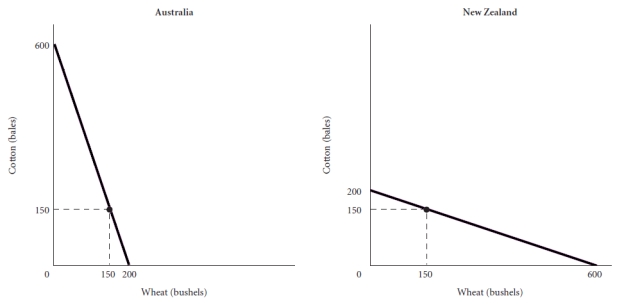Exam 19: International Trade, Comparative Advantage, and Protectionism
Exam 1: The Scope and Method of Economics65 Questions
Exam 2: The Economic Problem: Scarcity and Choice107 Questions
Exam 3: Demand, Supply, and Market Equilibrium86 Questions
Exam 4: Demand and Supply Applications37 Questions
Exam 5: Introduction to Macroeconomics64 Questions
Exam 6: Measuring National Output and National Income84 Questions
Exam 7: Unemployment, Inflation, and Long-Run Growth81 Questions
Exam 8: Aggregate Expenditure and Equilibrium Output58 Questions
Exam 9: The Government and Fiscal Policy71 Questions
Exam 10: The Money Supply and the Federal Reserve System96 Questions
Exam 11: Money Demand and the Equilibrium Interest Rate96 Questions
Exam 12: The Determination of Aggregate Output, the Price Level, and the Interest Rate100 Questions
Exam 13: Policy Effects and Costs Shocks in the Asad Model89 Questions
Exam 14: The Labor Market in the Macroeconomy111 Questions
Exam 15: Financial Crises, Stabilization, and Deficits102 Questions
Exam 16: Household and Firm Behavior in the Macroeconomy: a Further Look92 Questions
Exam 17: Long-Run Growth59 Questions
Exam 18: Alternative Views in Macroeconomics88 Questions
Exam 19: International Trade, Comparative Advantage, and Protectionism63 Questions
Exam 20: Open-Economy Macroeconomics: the Balance of Payments and Exchange Rates105 Questions
Exam 21: Economic Growth in Developing and Transitional Economies48 Questions
Select questions type
What are factor endowments?
Free
(Essay)
4.8/5  (30)
(30)
Correct Answer:
Factor endowments are the quantity and quality of labor, land, and natural resources of a country.
Critically evaluate the following statement. "Only if a country enjoys an absolute advantage in the production of a particular good will that country find it beneficial to trade it with another country.
Free
(Essay)
4.8/5  (34)
(34)
Correct Answer:
Absolute advantage is not what governs trade. Trade occurs instead because of comparative advantage that one country might have over another in the production of a particular good or service.
What is meant by the phrase "economic integration?"
Free
(Essay)
4.8/5  (30)
(30)
Correct Answer:
Economic integration occurs when two or more nations join to form a free trade zone.
Assume a candidate for president makes the argument that the United States should not trade with countries that have lower wages than we do because by doing so it will result in an export of American jobs abroad. Critically evaluate this claim.
(Essay)
4.8/5  (33)
(33)
Critically evaluate the following statement. "It is possible to calculate comparative advantage even when prices are not known."
(Essay)
4.7/5  (34)
(34)
 -Using the Figure above for Australia and New Zealand determine which country has the comparative advantage in the production of cotton and which the comparative advantage in the production of wheat.
-Using the Figure above for Australia and New Zealand determine which country has the comparative advantage in the production of cotton and which the comparative advantage in the production of wheat.
(Essay)
4.9/5  (39)
(39)
Why might a nation that has an absolute advantage in the production of a good or a service still not be able to find a trading partner?
(Essay)
4.9/5  (36)
(36)
One popular case for protectionism is the "Protection Saves Jobs" argument. What is the nature of this argument? What is its weakness?
(Essay)
5.0/5  (32)
(32)
Assume the United States televison manufacturing industry accuses the Japanese television manufacturers of dumping. Why should consumers not necessarily be worried about this practice?
(Essay)
4.9/5  (34)
(34)
What is the basis of the "Cheap Foreign Labor" argument and what are its weaknesses?
(Essay)
4.9/5  (30)
(30)
Related to the Economics in Practice on p. 369 [681]: Explain what Frederick Bastiat is trying to with his satirical petition.
(Essay)
4.8/5  (30)
(30)
Assume the following information for the United States and Mexico. The United
(Essay)
4.8/5  (42)
(42)
If a lower exchange rate spurs exports then why wouldn't it be a good idea of policymakers to intervene to push the exchange rate as low as they can?
(Essay)
4.9/5  (39)
(39)
Suppose country X can produce a personal computer at an opportunity cost of 1000 t-shirts. Assume that country X has a comparative advantage in the production of t-shirts. Would country X ever agree to terms of trade with country Y such that one personal computer would be exchanged for 1100 t-shirts?
(Essay)
4.9/5  (31)
(31)
Showing 1 - 20 of 63
Filters
- Essay(0)
- Multiple Choice(0)
- Short Answer(0)
- True False(0)
- Matching(0)